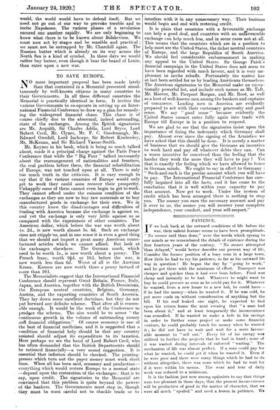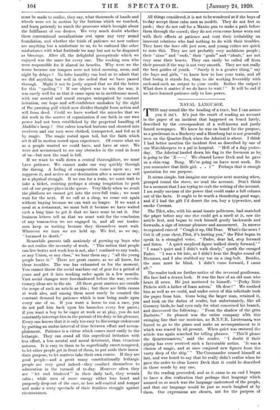PATIENCE.
IF we look back at the outward conditions of life before the war, their salient feature seems to have been promptitude. " No sooner said than done," were the words which sprang to our minds as we remembered the details of existence during the first fourteen years of the century. " No sooner attempted than delayed," would better describe our present way of life. Consider the former position of a busy man in a large town. How little he had to try his patience, so far as his outward life wa,s in question ! He began the day by " going to work," and he got there with the minimum of effort. Transport was cheaper and quicker than it had ever been before. Food was cheap and instantly to be had. Whatever he might want to buy he could procure as soon.as he could pay for it. Whatever he wanted, from a new house to a new hat, he could have— if he had the money—when he wanted it. If he was cold, he put more coals on without consideration of anything but the bill. If his roof leaked one night, he expected to find upon his return home the next evening that " a man had been about it," and at least temporarily the inconvenience was remedied. If he wanted to make a hole in his savings in order to further some project or make some financial venture, he could probably touch his money when he wanted it ; he did not have to wait and wait for a more favour- able moment to " sell out." Every bit of his energy was utilized to further the projects that he had in hand ; none of it was wasted during intervals of enforced " waiting." The mechanism of life was almost perfect. if a man could pay for what he wanted, he could get it when he wanted it. Even if he were poor and there were many things which he had to do without altogether, there was none which he had to wait for if it were within his means. The wear and tear of daily work was reduced to a minimum.
It is the fashion just now among optimists to say that things were too pleasant in those days, that the present inconvenience will be productive of good in the matter of character, that we were all much " spoiled " and need a lesson in patience. We
must be made to realize, they say, what thousands of hands and wheels were set in motion by the buttons which we touched, and learn patiently to watch the processes which brought about the fulfitient of our desires. We very much doubt whether these conventional moralizations rest upon any very sound foundittion, and whether the trials of patience we now endure are anything but a misfortune to us, to be endured like other misfortunes with what fortitude We may but not to be disguised as blessings. After all, the delightful promptitude which we enjoyed was the same for every one. The working men who were responsible for it shared its benefits. Why were we the worse because our tempers were not tried morning, noon, and night by delays ? No false humility can lead us to admit that we did anything but well in the ordeal that we have passed through. Might it not be justly argued that we did the better for this " spoiling " ? If our object was to win the war, it was surely well for us that it came upon us in mettlesome mood, with our mental and moral energies unimpaired by constant irritation, our hope and self-confidence unshaken by the sight of the yawning gulf which now divides thought from action and will from deed. Could we have worked the miracles that we did work in the matter of organization if our faith in our awn power had not been established by the perpetual handling of Aladdin's lamp ? Our rulers touched buttons and shouted into receivers and our men were clothed, transported, and fed as if by magic. The magic rested upon toil, but the faith which set it all in motion rested upon experience. Of course what we as a people wanted we could have, and have at once. We were not accustomed to see any obstacles in the road in front of us—but now the road is full.
If we want to walk down a central thoroughfare, we must have patience. We cannot make our way quickly through the throng. A feeling of exasperation comes upon us ; we suppress it, and arrive at our destination after a mental as well as a physical struggle. If we run for a train, we must wait to take a ticket, resisting perhaps a strong temptation to push out of our proper place in the queue. Very likely when we reach the platform we cannot get into the over-full train ; we must wait for the next. If we call at a shop, we come out again without buying because we can wait no longer. If we want a meal at a restaurant, we must bolt it because we have waited such a long time to get it that we have none to eat it. Our business letters tell us that we must wait for the conclusion of any transaction we are engaged in, and all our trades- men keep us waiting because they themselves must wait. Wherever we turn we are held up. We feel, as we say, " harassed to death."
Meanwhile parents talk anxiously of growing-up boys who do not realize the necessity of work. " This notion that people can live better and work less is not, alas ! confined to any trade, or any Union, or any class," we hear them say.; ".all the young people have it." There are great causes, as we all know, for these troubles. The war has exhausted us for the moment. You cannot throw the social machine out of gear for a period of years and get it into working order again in a few months. Vast social changes were foreshadowed before the war, revolu- tionary ideas are in the air. All these great matters are outside the scope of such an article as this ; but there are little causes at work also, and among them must surely be counted the constant demand for patience which is now being made upon every one of us. If you want a horse to run a race, you do not pull him back upon his haunches every few paces ; if you want a boy to be eager at work or at play, you do not constantly interrupt him in the pursuit of his duty or his pleasure. Every one knows that it is only too easy to discourage endeavour by putting an undue interval of time between effort and accom- plishment. Patience is a virtue which comes most easily to the lethargic. They can stand all this superficial irritation with less effort, a less mental and moral detriment, than vivacious natures. It is easy to them to be superficially sweet-tempered, to let other people get in front of them, to put aside their imme- diate purpose, to let matters take their own course. If they are good people—and a great many constitutionally lethargic people are very good indeed—they conduct themselves to admiration in the turmoil of to-day. However often they are " let and hindered " in their daily task, they remain calm ; while men of more energy either lose heart and purposely drop out of the race, or lose self-control and temper and make a sorry spectacle of their fruitless struggle against circumstance. All things considered, it is not to be wondered at if the boys of to-day accept these calm men as models. They do not fret or push ; they do not call for a Maxim gun to make a path before them through the crowd ; they do not even come home worn out with their efforts at patience and vent their irritability on innocent relations who had nothing to do with their troubles. They have the beau role just now, and young critics are quick to note this. They are not probably very ambitious people ; their "aims" and "ends," their "goals" and "ideals," are not very near their hearts. They can easily be called off from their pursuit if the way is not very smooth. They are not really the best guides of youth. " Surely it is a greater thing," say the boys and girls, " to know how to lose your train, and all that losing it stands for, than to die working feverishly with such-and-such an output to your credit. Bother the output ! What does it matter if we do have to wait ! " It will be sad if we have learned patience only to lose power.



































 Previous page
Previous page